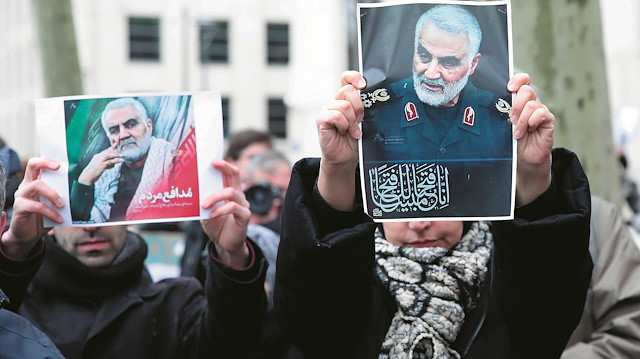
Panel focuses on US killing of top Iranian general
Iran has a serious military presence in the region, but its power is a coercive, said the acting head of an Ankara-based think-tank Friday.
Hakki Uygur spoke at a panel discussion on the growing tensions in the Middle East among Iran and the U.S. after the killing of Iran’s Gen. Qasem Soleimani.
It was held by his group, Center for Iranian Studies (IRAM).
Uygur said the point we have reached today, the level of conflict, means a new period. It means the political and economic tension has turned to militarization.
IRAM’s Coordinator of Foreign Affairs, Ismail Sari, said killing Soleimani is a milestone for U.S. Foreign policy toward Iran.
“Until today, the U.S. was following maximum pressure on Iran for drawing Iran to table over nuclear discussion, but what the killing of Soleimani showed is that the Trump administration would be able to bring the military option to the table,” said Sari.
Mehmet Koc, Coordinator of Domestic Politics, said demonstrations at Soleimani’s funeral in Iraq was aimed to show Iran’s investment in Iraq for many years, and the ceremony continued in Iran over Ahvaz, which was not in the plan.
“They were following a goal actually, because Ahvaz is a city where mostly Arab people live and geopolitically has importance for Iran. Also, most casualties were given in this city after oil protests increased in November 2019. Over 100 people lost their lives which most of them were civilian,” added Koc.
Hadi Khodabandeh Loui Coordinator of Security Studies said Gen. Mohammad Ali Jafari, commander-in-chief of the Iranian Revolutionary Guard Corps, was following active deterrence, but when Hossein Salami was appointed commander-in-chief, Iran started to follow aggressive position.
Loui drew attention to Iran’s possible blockage of waterways in the Gulf. “Iran has 2,000 Chinese EM-52 mines in their inventory,” he said.
Nihat Ali Ozcan, an academic at the University of Economics and Technology, said there is a political results of the attack.
“There is a moral and psychologic dimension of this killing of a sovereign state’s official on a sovereign state’s soil by another sovereign state. It is open gate for others which it is not a good example,” said Ozcan.
The Center for Iranian Studies (IRAM) has been established to conduct research on Iran and Iranian affairs. It is the first center of its kind in Turkey that focuses on Iran and the region.
Hello, the comments you share on our site are a valuable resource for other users. Please respect other users and different opinions. Do not use rude, offensive, derogatory, or discriminatory language.
The floor is all yours.








